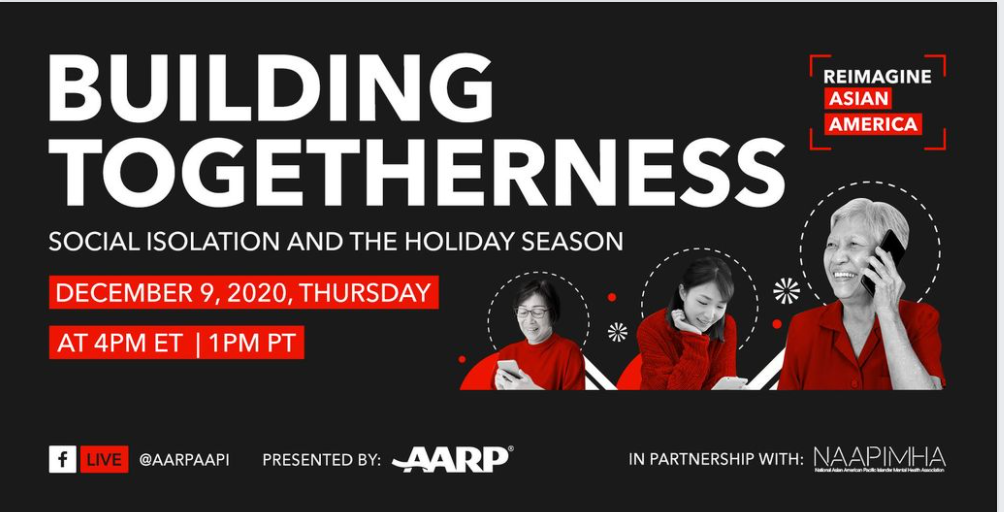
Ron Mori
Last month, I wrote about how two-thirds of adults report experiencing social isolation and high levels of anxiety since the beginning of the pandemic. Unfortunately, we are now in the second wave of the pandemic, and health experts are warning us to keep our guards up as we enter the holiday season. For me, each month is getting tougher to cope with the stress and anxiety of the unknown.
I try to cope with humor, and I often joke with my co-workers about my nine months working in my basement home office.
Now that the days are shorter, there have been times when I come up from my basement, and it’s dark outside.
I have to admit, it is taking a toll on my mental health. However, a new free monthly Livestream event series focused on mental health is helping me stay focused and feeling empowered.
Our new AARP AAPI series, “Reimagine Asian America,” features Dr. DJ Ida, executive director of the National Asian American Pacific Islander Mental Health Assn., as well as other experts and storytellers committed to creating a more humane and equitable world for Asian Americans across generations.
Tough topics are discussed, and viewers of our Facebook livestream can ask real-time questions of our distinguished panel. Our next livestream will focus on “Building Togetherness: COVID-19 and the Holiday Season.”
For Help
• National Suicide Prevention Lifeline: (800) 273-TALK (8255)
• Veterans Affairs Caregiver Support Line: (855) 260-3274
• National Alliance for Caregiving resource page
• AARP Community Connections
• AARP Support Line: (877) 333-5885
• AARP Family Caregivers Facebook Discussion Group
It takes place on Dec. 9 at 4 p.m. EST on the AARP AAPI Facebook page. You will need to register in advance in order to participate in this free event.
Dr. Ida will moderate a conversation with experts on how we build togetherness as communities practice social distancing during the holiday season. Especially important are the alarming statistics that I have written about before on the negative impact of social isolation as a public health crisis.
According to “The Pandemic Effect: A Social Isolation Report” — a study conducted by AARP Foundation in collaboration with the United Health Foundation — many of those affected have not turned to anyone for help, perhaps because many don’t have reliable social support networks.
Social isolation is defined as an absence of meaningful social relationships. Studies have found that the health risks of social isolation can be more harmful than obesity, and prolonged isolation is equivalent to smoking 15 cigarettes a day.
Unpaid family caregivers also reported having more symptoms of depression and anxiety and starting or increasing substance use to cope with the stress of COVID-19 on top of caring for their loved ones, compared to the other respondents. The survey included almost 5,500 adults.
 A recent report based on a nationwide survey from the Centers for Disease Control and Prevention about the types of mental health challenges people are facing during the pandemic found that nearly 31 percent of unpaid family caregivers reported seriously considering suicide in the preceding 30 days, compared with 11 percent of the other adults taking the survey who were not caregivers.
A recent report based on a nationwide survey from the Centers for Disease Control and Prevention about the types of mental health challenges people are facing during the pandemic found that nearly 31 percent of unpaid family caregivers reported seriously considering suicide in the preceding 30 days, compared with 11 percent of the other adults taking the survey who were not caregivers.
This new data has mental health experts concerned about its ripple effects. A lot of the services available for caregivers, such as respite and home health care, have been affected by the pandemic. With only online social support available, experts worry that the isolation of caregivers can make the situation worse.
The survey also indicates that unpaid caregivers are doing worse over time. Experts say this is worrisome. Most unpaid family caregivers say they don’t have a choice, and half of them are very stressed, according to the report “Caregiving in the United States 2020” by the National Alliance for Caregiving and AARP.
Seventy-two percent of people who say they feel alone as an unpaid family caregiver say they have high emotional stress, according to the study. During this holiday season, don’t forget to think about family caregivers you know, and reach out to them during these difficult times.
For additional articles on mental health, check out the AARP Mental Health Resource Center page at https://www.aarp.org/health/conditions-treatments/mental-health-resource-center.
Ron Mori is a member of the Washington, D.C., JACL chapter and manager of community, states and national affairs — multicultural leadership for AARP.



